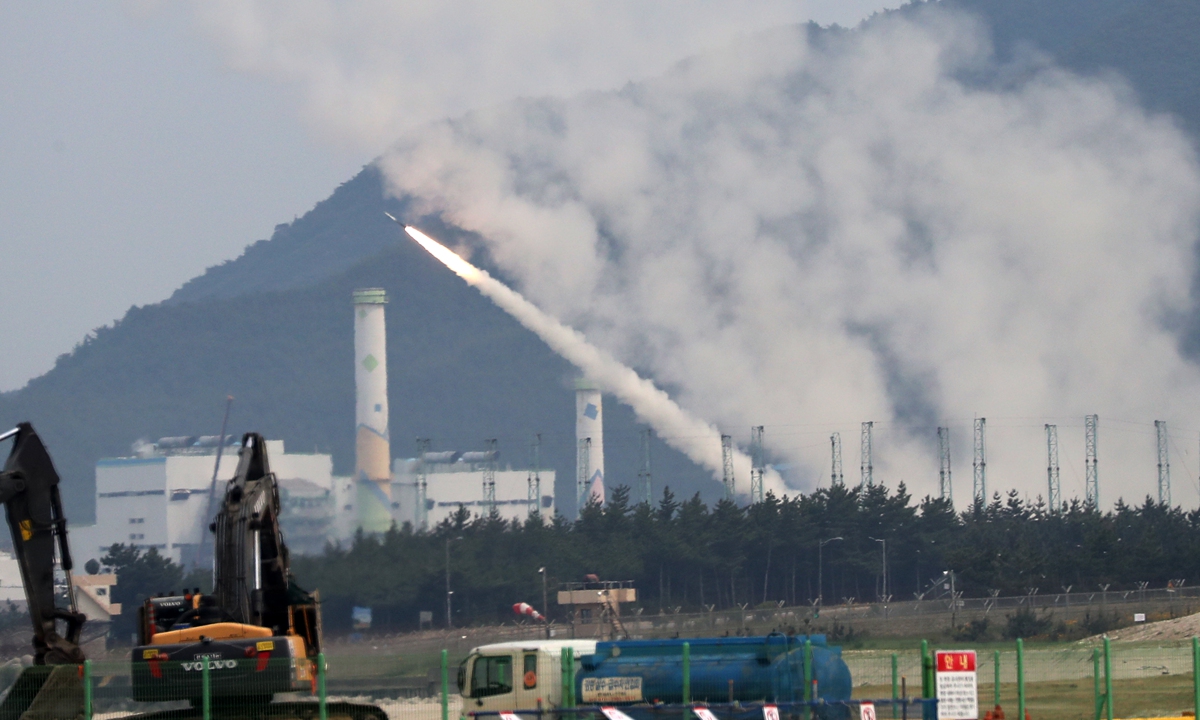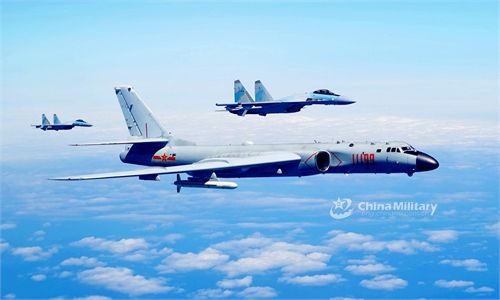
The US and South Korea jointly fire two missiles on May 25, 2022 in response to North Korea's test of a suspected intercontinental ballistic missile and two other missiles, according to South Korea's Joint Chiefs of Staff. Photo: VCG
The US and South Korea jointly fired two missiles on Wednesday in response to North Korea's reported launch of three missiles, marking a further escalation of the Korean Peninsula situation as US President Joe Biden concluded his Asia trip to enhance an alliance with South Korea and Japan.
Closely watching Biden's trip, North Korea, Russia and China are on high alert to US troublemaking attempts and will respond firmly to provocations to defend their interests, observers said, warning the external interventions will further shake hard-fought stability in Northeast Asia and cause unrest, insecurity and even militarization of the area.
Yonhap News Agency reported that North Korea's missile test came only days after Yoon and Biden held a summit in Seoul and less than a day after Biden's QUAD summit in Japan. North Korea has also been testing a nuclear triggering device, Yonhap reported.
The North has not released information about the test but Yonhap reported one of the three missiles was an intercontinental ballistic missile (ICBM).
Lü Chao, an expert on the Korean Peninsula issue at the Liaoning Academy of Social Sciences, said Pyongyang was expressing discontent and opposition to enhanced US-South Korea military collusion, including "extended deterrence" mentioned in a joint statement made during Biden's visit and the return of the two countries' live fire drills after a five-year lapse with more offensive weapons.
The US bears inescapable responsibility for the escalating Korean Peninsula tensions and the inter-Korean antagonism, Lü said.
On Tuesday when Biden departed Japan, China and Russia held a regular joint strategic patrol in the Asia-Pacific region for the fourth consecutive year. The Russian defense ministry had a high-key disclosure of the operation, including aircraft and other equipment involved.
Japan identified four Chinese H-6 bombers, two Russian Tu-95 bombers and a Russian Il-20 reconnaissance aircraft throughout the Sea of Japan, the East China Sea and the West Pacific.
Though the pre-scheduled patrol was not directly targeting the QUAD summit, it can be seen as enhanced China-Russia military coordination amid provocations by the US and Japan in the region, observers said.
Biden said on Monday the US would intervene militarily if the Chinese mainland were to reunify with the island of Taiwan by force, followed by White House claims that US' policy on relevant affairs did not change.
Japan recently also repeatedly tested China's bottom line, including supporting Taiwan to join the World Health Assembly and remarks hinting that Japan would "co-defend" the island.
Japan has its own calculations in Taiwan-related actions, as it wants to raise military capacities and regional presence with closer ties with the US, Da Zhigang, director of the Institute of Northeast Asian Studies at Heilongjiang Provincial Academy of Social Sciences, told the Global Times on Wednesday. But irresponsible words and deeds will destroy the atmosphere of cooperation and dialogue, severely undermine peace and stability in the region.
Besides North-South Korea tensions, China-Japan and Russia-Japan relations also involve historical burdens, territorial disputes, or both.
Those conflicts are cooled off when peace and cooperation are the mainstream of bilateral relations, but will turn intense when geopolitics and external forces' meddling dominate, observers said.
China, Russia and North Korea are determined to defend their sovereignty and interests amid US-manipulated provocations which are channeled through US allies, Da said, adding that the fermenting of tensions in Northeast and East Asia may intertwine and escalate to camp confrontation, a "Cold War" scenario the US has spared no efforts creating to contain China and whittle down Russia.
The expert also warned the US and NATO may use the Northeast Asia situation as an excuse to push for NATO "Asianization" or an Asian version of NATO, while the greater the external forces' presence in the region, the more dangerous the situation will be.

